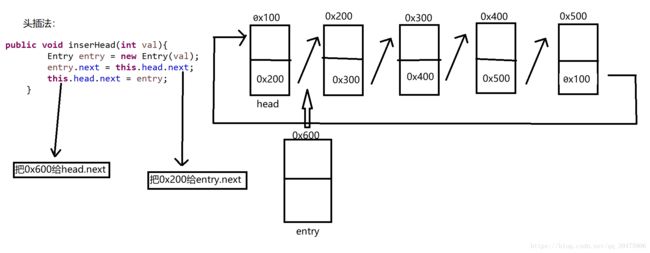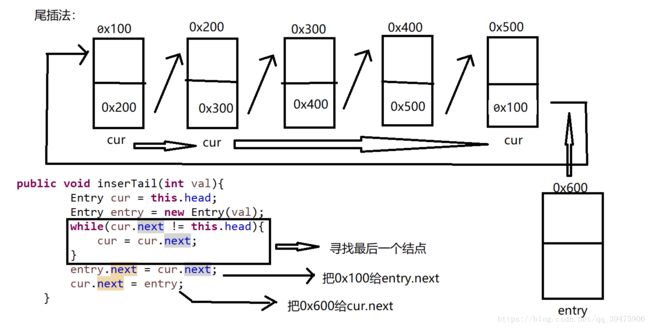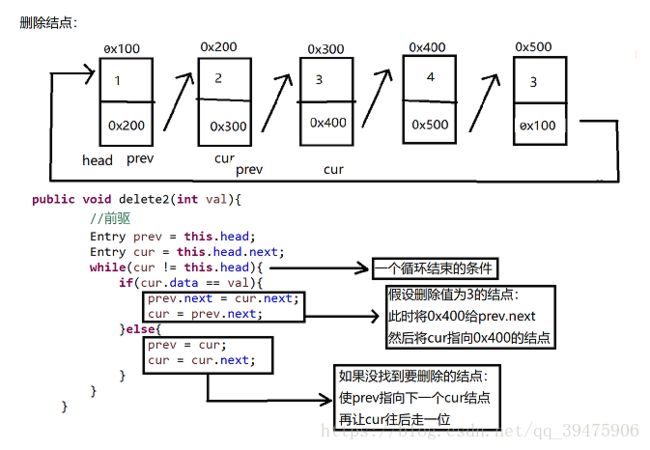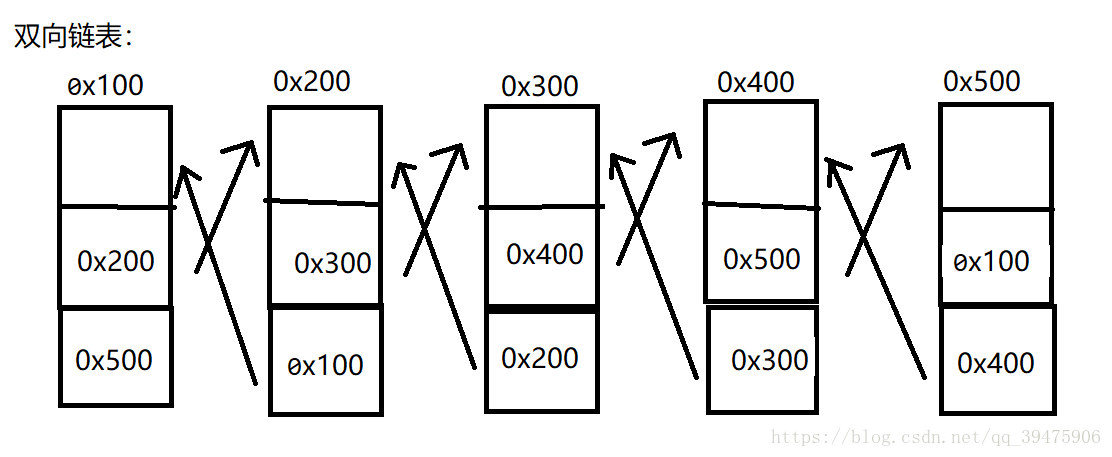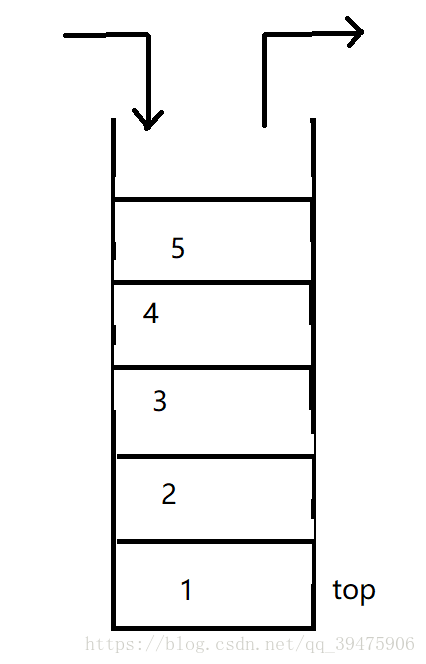循环单链表、双向链表以及顺序栈
1.循环单链表
循环单链表的结构:
循环单链表的头插
循环链表的尾插
循环链表的删除
class TestClink{
class Entry{
int data;
Entry next;
//无参构造方法
public Entry(){
this.data = -1;
next = null;
}
//有参构造方法
public Entry(int data){
this.data = data;
this.next = this;
}
}
private Entry head = null;
//头结点的初始化
public TestClink(){
this.head = new Entry();
this.head.next = this.head;
}
/**
* 头插法
* @param val
*/
public void inserHead(int val){
Entry entry = new Entry(val);
entry.next = this.head.next;
this.head.next = entry;
}
/**
* 尾插法
* @param val
*/
public void inserTail(int val){
Entry cur = this.head;
Entry entry = new Entry(val);
while(cur.next != this.head){
cur = cur.next;
}
entry.next = cur.next;
cur.next = entry;
}
/**
* 删除一个val结点
*/
public void delete(int val){
//前驱
Entry prev = this.head;
Entry cur = this.head.next;
while(cur != this.head){
if(cur.data != val){
cur = cur.next;
prev = prev.next;
}else{
prev.next = cur.next;
return;
}
}
}
/**
* 删除循环单链表里所有的val结点
*/
public void delete2(int val){
//前驱
Entry prev = this.head;
Entry cur = this.head.next;
while(cur != this.head){
if(cur.data == val){
prev.next = cur.next;
//cur = cur.next;也是正确,前面更规范
cur = prev.next;
}else{
prev = cur;
cur = cur.next;
}
}
}
/**
* 求长度
* @return
*/
public int getLength(){
int length = 0;
Entry cur = this.head;
while(cur.next != this.head){
cur = cur.next;
length++;
}
return length;
}
/**
* 是否为空
*/
public boolean isEmpty(){
Entry cur = this.head;
if(cur.next != this.head){
return false;
}
return true;
}
/**
* 打印输出
*/
public void show(){
Entry cur = this.head.next;
while(cur != this.head){
System.out.print(cur.data+" ");
cur = cur.next;
}
System.out.println();
}
}
/**
*
* @author jhl
*
*/
public class TestDemo1 {
public static void main(String[] args) {
// TODO Auto-generated method stub
TestClink t1 = new TestClink();
int testClinkLength = 9;
for(int i = 0;i//t1.inserTail(i);
}
t1.inserTail(5);
t1.inserTail(5);
t1.inserTail(5);
t1.show();
System.out.println("=======删除后=======");
t1.delete2(5);
t1.show();
}
} 2.双向链表
双向链表的结构
双向链表头插

双向链表尾插以及删除:和循环单链表的尾插以及删除原理相同,只是在插入及删除有4个数据的变化
代码:
class DoubleLink{
class Entry{
int data;
/**
* 后继
*/
Entry next;
/**
* 前驱
*/
Entry prio;
public Entry(){
this.data = -1;
this.next = null;
this.prio = null;
}
public Entry(int data){
this.data = data;
this.next = null;
this.prio = null;
}
}
private Entry head = null;
public DoubleLink(){
this.head = new Entry();
}
/**
* 头插法
*/
public void inserHead(int val){
Entry entry = new Entry(val);
entry.next = this.head.next;
entry.prio = this.head;
this.head.next = entry;
if(entry.next != null){
entry.next.prio = entry;
}
}
/**
* 尾插法
* @param val 数据
*/
public void inserTail(int val){
Entry cur = this.head;
Entry entry = new Entry(val);
while(cur.next != null){
cur = cur.next;
}
cur.next = entry;
entry.prio = cur;
}
/**
* 删除值为val的结点
*/
public void delete(int val){
Entry cur = this.head.next;
while(cur != null){
if(cur.data == val){
cur.prio.next = cur.next;
//删除最后一个结点的时候
if(cur.next != null){
cur.next.prio = cur.prio;
}
}
cur = cur.next;
}
}
/**
* 打印输出
*/
public void show(){
Entry cur = this.head.next;
while(cur != null){
System.out.print(cur.data + " ");
cur = cur.next;
}
System.out.println();
}
}
/**
*
* @author jhl
*
*/
public class TestDemo2 {
public static void main(String[] args) {
// TODO Auto-generated method stub
DoubleLink a1 = new DoubleLink();
a1.inserHead(10);
a1.inserHead(20);
a1.inserHead(50);
a1.inserHead(30);
a1.inserTail(50);
a1.show();
System.out.println("=====删除后====");
a1.delete(50);
a1.show();
}
}3.顺序栈
顺序栈结构
入栈
1.先判断栈是否已满
2.每入一个使top++
public boolean push(int val){
if(isFull()){
return false;
}
this.elem[this.top++] = val;
return true;
}出栈
1.先判断栈是否为空
2.每出一个使top–
public void pop(int val){
if(isEmpty()){
return;
}
--this.top;
} 代码:
class Stack{
int top;
int[] elem;
public Stack(){
this(10);
}
public Stack(int size){
this.elem = new int[size];
this.top = 0;
}
/**
* 栈是否已满
*/
public boolean isFull(){
if(this.top == this.elem.length){
return true;
}
return false;
}
/**
* 入栈
*/
public boolean push(int val){
if(isFull()){
return false;
}
this.elem[top++] = val;
//this.top()++;
return true;
}
/**
* 是否为空
*/
public boolean isEmpty(){
if(this.top == 0){
return true;
}
return false;
//return this.top = 0;直接代替
}
/**
* 出栈
*/
public int pop(){
if(isEmpty()){
return -1;
}
return elem[--this.top];
}
/**
* 得到栈的元素
*/
public int getTop(){
if(isEmpty()){
return -1;
}
//不能进行--top,会将top值减掉
return this.elem[this.top-1];
}
/**
* 打印栈内元素
*/
public void show(){
for(int i =0;i<this.top;i++){
System.out.println(this.elem[i]+" ");
}
System.out.println();
}
}
/**
*
* @author jhl
*
*/
public class TestDemo3 {
public static void main(String[] args) {
// TODO Auto-generated method stub
Stack s1 = new Stack();
int length = 10;
for(int i = 0;i
